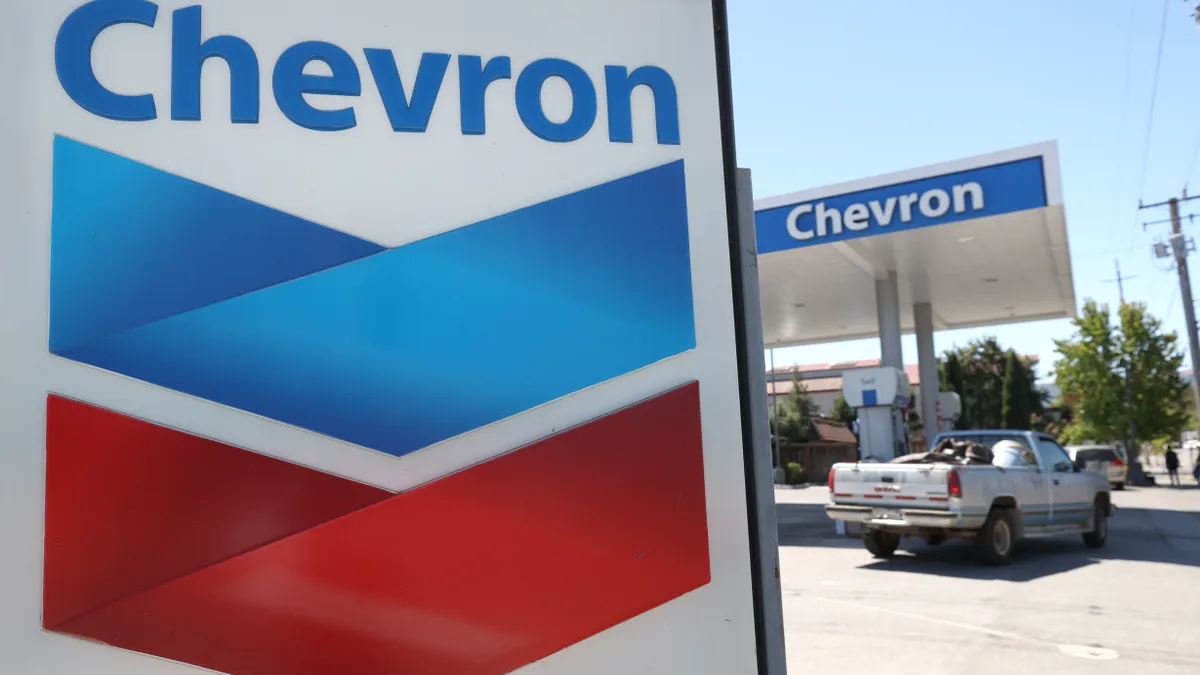Dive Brief:
- Chevron Corporation’s $53 billion all-stock acquisition of fellow oil and gas company Hess will enable the firm to extend its free cash flow growth and to further its long-term performance, executives including CFO Pierre Breber said Monday in a press release.
- “With greater confidence in projected long-term cash generation, Chevron intends to return more cash to shareholders with higher dividend per share growth and higher share repurchases,” Breber said of the transaction in a statement included in the release.
- The San Ramon, California-based company will also gain a 30% ownership stake in the ExxonMobil-operated Stabroek Block, located in South American country Guyana, with the acquisition, which is expected to enable the company to further its long-term free cash flow growth well into the 2030s, Chevron CEO Mike Wirth said Monday during an investor conference call about the acquisition according to a transcript filed with the Securities and Exchange Commission.
Dive Insight:
Chevron agreed to acquire Hess in an all-stock transaction valued at $53 million or $171 per share, according to its Monday announcement. The total enterprise value of the transaction, including debt is $60 billion, the company said. As well as its stake in Guyana’s Stabroek block, Chevron is also gaining 465,000 net acres of long-duration inventory in Bakken, complementary assets within the Gulf of Mexico and Hess’ free cash-flow generating natural gas business in Southeast Asia.
As part of the deal, Hess shareholders will receive 1.0250 Chevron shares for each of their Hess shares, representing a 10.3% premium over the 20-day average closing price, Wirth said during the investor call. Hess CEO John Hess is also expected to join Chevron’s board of directors as part of the acquisition.
The transaction is “about long-term growth, long-term inventory and duration and free cash flow growth, cash flow per share accretion,” Breber said Monday during the investor call.
It is expected to become accretive to cash flow in 2025 after “achieving synergies and start-up of the fourth FPSO [floating production, storage and offloading] vessel in Guyana,” Wirth said, with Chevron expecting to more than double its free cash flow by 2027.
The long-term free cash flow benefits provided by the Hess acquisition will also help to boost Chevron’s production as well as enable the company to return more money to its shareholders. Chevron expects to increase its dividend per share in January for its first quarter by 8% to $1.63 per share — following a 6% compounded annual growth rate for its dividend per share over the past five years, the company said.
Chevron reported record shareholder distributions of $7.2 billion for Q2 2023, including $2.8 billion in dividends and $4.4 billion in share repurchases, according to the company’s earnings report for the quarter ended June 30.
Home to the largest and most profitable crude oil discovery in the past decade comprising approximately 11 billion barrels, Guyana’s Stabroek block represents a significant strategic asset for Chevron’s long-term growth. Its 30% stake in the block helps to put the company on better footing with its top U.S. competitor, ExxonMobil, which has a 45% stake in the block and operates the project, Bloomberg reported. Chinese oil and gas producer CNOOC Limited holds the remaining 25% stake.
Chevron’s acquisition of Hess follows only weeks after ExxonMobil announced it would be acquiring fellow energy company Pioneer Natural Resources in an all-stock transaction valued at $59.5 billion or $253 per share, the company said in a press release. The deal, which has an implied enterprise value of $64.5 billion, more than doubles ExxonMobil’s Permian footprint and is expected to yield double-digit returns for the company, it said.
Chevron did not immediately respond to requests for comment.












